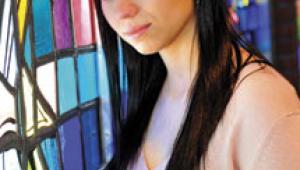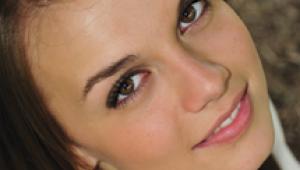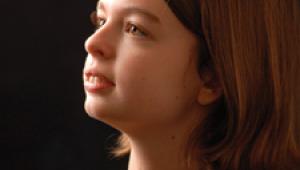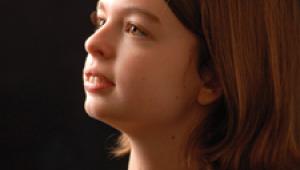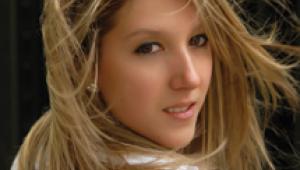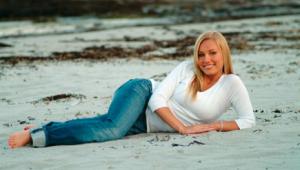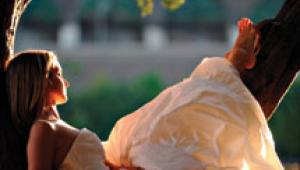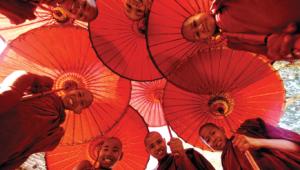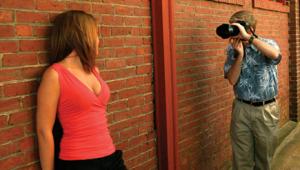Making A “Monte” Portrait
Take A Simple, Direct Approach Page 2
The back profile of the bride was created with all natural light coming in under the porch rooftop. I positioned the camera to keep a simple background behind her profile.
All together the page says, "Brides!" The backgrounds are all there, but the brides are still the center of attention.
Learn To Use Ambient Light
You need to know how to put ambient light to use. You need to know where it
is and how to harness it to create lighting situations that create the "look"
that you desire. The picture of the bride with the flowers beneath her chin
has become one of my signature pictures. A window behind her created the highlights
on the left side of her face. Another window behind me was the fill light. That's
all there was to it.
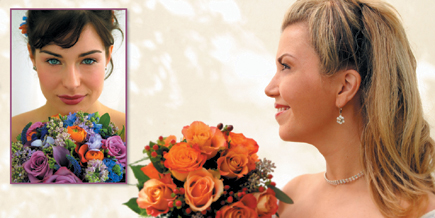
The profile of the bride was created outdoors under cover.
The shadows in the background of the page were the actual shadows of tree leaves
behind the translucent panel when I
took her picture.
Black Backgrounds Are Back!
The black background works perfectly for bringing these four portraits together.
The pink jumps out at you. So do the faces. Why? Because there's nothing
else to take your attention away from their faces.

An Elinchrom blower sent the fur flying in the first picture; made on-stage
during one of my Canon platform appearances. The same with the girl surrounded
by pink chiffon. I always have yards and yards of fabrics to wrap around my
models if I think that the fabrics can be used effectively. In this portrait
I had two people hold up additional matching fabric behind her. Completely surrounded
by pink, her eyes seem to just pop out of the picture, don't they?
For both of these first two pictures my fill light was down at the knees of
these women. The light was pointed directly at their knees, not pointed upward
toward their faces. Just a little glow from the light came up into their faces.
There are no shadows cast by the fill light; it merely opens up areas of the
face where there would normally be shadow. Thus, the eyes are highlighted beautifully
with a second catchlight at the bottom of their pupils.
The profile of the bride was made under cover of a porch with a translucent
panel changing direct sunlight to soft lighting. Of course, I positioned her
to have the shadows on her face just as if I were doing studio lighting indoors.
It's the same lighting pattern on basically everything I do.
The girl with the glasses was lying down resting. That's late afternoon
direct sunlight on her face. You can see the sun reflecting in her glasses.
I simply darkened the surrounding area in Photoshop for drama.
Strong Lighting
I often strengthen the lighting ratio on men's portraits. It seems that
a higher contrast in men's portraits makes the men appear stronger, more
forceful. The strong lighting in the man's portrait (bottom right) was
accomplished by split lighting his face with one light, placing the camera where
it saw the 2/3 view of his face and keeping the main light in its normal position
(at a 45Þ angle to the front of his face). A fill light (behind the camera)
is two f/stops less than the main light on his face.
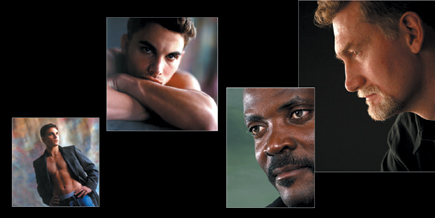
The other three portraits were lit by window light. I was careful to preserve
detail throughout the images--from the brightest highlight down to the
deepest shadow. I did it digitally by exposing for the highlights and bringing
up the shadows with a reflector.
So, now that you've studied my work by seeing a collection of all kinds
of subject matter, can you recognize my style? What is it? Can you see any continuity
between all the images? Have I accomplished my goal?
An incurable romantic? I guess that's one way to describe a Monte Portrait.
- Log in or register to post comments
